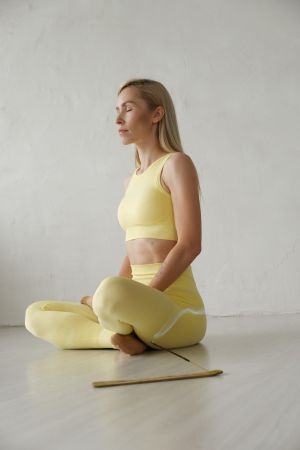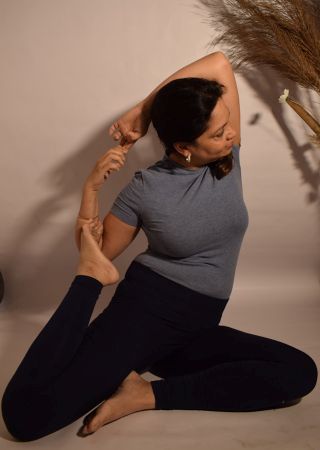Yin Yoga, The Little Gem That Will Ease Your Menopause Symptoms & Bring You Balance
Ha! The joys of menopause…
As a 50something years old, I know all too well how debilitating the process of menopause transitioning can be.

I am largely “on the other side” but it has not been that long and I remember all too well the sleepless nights, the soaking wet sheets, the brain fog, the rage, the exhaustion, the zero sex drive and lack of intimacy, the feeling of being out of control and more importantly the helplessness of not knowing when this hellish time was going to end.
But, please believe me when I say that it does get better and like with all transitions, you must trust the process so you can arrive at a more balanced, peaceful and satisfying place.
Is it easy?
No, it is not, especially if, like me, you choose to say no to HRT. It is a personal choice and mine was to not embrace a short gain solution that would delay the inevitable.
How long does it last?
This is the huge variable… we are all different and each of us has a different path to walk on, some shorter and easier, some longer and more challenging.
Does it mean we need to put life on hold waiting for things to be “normal” again?
Not at all, after all your new normal will be very different, but there will be joy, there will be clarity, there will be balance and peace if you embrace it as the natural rite of passage that it is, in the same way that you embraced your first period as the first step into a new era, that of womanhood.

The perimenopause and the menopause have been largely vilified in recent years and transformed into an illness to be fought rather than a natural part of being a living human being, and this can be incredibly destabilising. The constant search for the magic potion that will make it all go away and allow you to function as you used to can be exhausting.
Fortunately, there is so much more awareness and understanding about the effect of the menopause and this newfound openness allows us the freedom of flowing with it rather than constantly fighting it, feeling inadequate, hiding and masking our feelings and pretending that all is well.
So, I have decided to share with you all the things that helped me through this process, in a series of articles that I hope will provide some comfort, support and ideas for how you can go your own way onto this journey and find the hidden nugget in it, the thing that can bring you joy and make you feel glad to be alive, hot flashes and all!
First up, is Yin Yoga.
What is Yin Yoga?
Yin yoga is a slow, meditative style of yoga that involves holding poses for an extended period, typically 3 to 5 minutes or longer. It has its roots in Taoist philosophy and Traditional Chinese Medicine (TCM), focusing on balancing energy (Qi) within the body and unlike more active yoga styles (such as Vinyasa or Hatha), yin yoga focuses on deep tissue release, targeting the fascia, ligaments, joints, and bones rather than just muscles.
Key Characteristics of Yin Yoga:
- Long Holds – Poses are held for minutes at a time, allowing for deep relaxation and flexibility.
- Passive Stretching – Instead of using muscular effort, you relax into the pose using gravity and breath.
- Focus on Connective Tissues – Helps improve joint mobility, flexibility, and circulation.
- Mindfulness & Meditation – Encourages stillness and inner awareness, making it both a physical and mental practice.

Why is Yin Yoga so good for Menopause & Perimenopause?
Menopause is a significant life transition that brings hormonal shifts, physical changes, and emotional challenges. While every woman’s experience is unique, there are common symptoms that include hot flashes, mood swings, sleep disturbances, and joint stiffness that can be managed through this slow-paced, meditative form of yoga, whilst supporting overall well-being during menopause.
1. Supports Hormonal Balance
Yin yoga stimulates the endocrine system, which regulates hormone production. Gentle compression and release in certain poses help activate glands such as the thyroid and adrenal glands, supporting better hormone regulation. By reducing cortisol levels, yin yoga can counteract the stress-related hormonal imbalances common during menopause.
2. Reduces Hot Flashes & Night Sweats
The deep breathing and relaxation techniques in yin yoga activate the parasympathetic nervous system, which helps cool the body and regulate temperature. Poses such as Legs Up the Wall and Reclining Butterfly encourage circulation and relaxation, which may lessen the frequency and intensity of hot flashes and night sweats.
3. Improves Sleep Quality
Insomnia and disrupted sleep are common during menopause, often due to anxiety, hormonal fluctuations, or physical discomfort. Yin yoga’s meditative nature calms the nervous system, reduces stress, and promotes deep relaxation, making it easier to fall and stay asleep. A regular practice before bedtime can lead to better sleep patterns.
4. Supports Bone Health
Menopause is often associated with a decline in bone density, increasing the risk of osteoporosis. Yin yoga applies gentle stress to the bones through long-held poses, stimulating bone growth and improving strength. Poses such as Dragon Pose (Low Lunge) and Caterpillar Pose (Seated Forward Fold) help maintain bone density and flexibility.
5. Relieves Joint & Muscle Stiffness
Lower oestrogen levels can lead to joint pain and stiffness. Yin yoga targets deep connective tissues, enhancing circulation and increasing flexibility. The prolonged holds in yin yoga help release tension in tight areas, particularly in the hips, spine, and shoulders, improving overall mobility and comfort.
6. Reduces Stress & Anxiety
Emotional fluctuations, including increased anxiety and mood swings, are common during menopause. Yin yoga’s focus on mindfulness, breath awareness, and long, meditative holds activates the relaxation response, reducing stress and fostering emotional balance. Practicing Reclining Twist or Sphinx Pose can provide a sense of grounding and calm.
7. Enhances Pelvic & Hip Health
Many yin yoga poses focus on opening the hips and pelvic area, which can become tense due to hormonal shifts. Butterfly Pose and Sleeping Swan (Pigeon Pose) help release stored tension, improve circulation, and promote better pelvic health, which is essential for comfort and mobility.
8. Promotes Emotional Well-Being
Menopause is not just a physical transition but also an emotional and psychological one. Yin yoga encourages self-awareness, patience, and self-acceptance, helping women navigate this stage with a sense of grace and resilience. The practice fosters a deeper connection with the body, promoting emotional healing and inner peace.
Conclusion
Yin yoga is a gentle yet powerful tool for managing menopause symptoms, enhancing overall well-being, and embracing this new phase of life with ease. By incorporating yin yoga into a daily or weekly routine, you can experience improved hormonal balance, reduced stress, better sleep, and enhanced physical health. Whether practiced alone or as part of a broader wellness plan, yin yoga offers a sanctuary of calm, healing, and renewal during menopause.

As always, please consult your medical team before embarking on any physical activity that may have contraindications for you, especially if you have pre-existing conditions.
For me, introducing a regular yin yoga practice has made a huge difference, it has taken me out of my head and my need to control what cannot be controlled, and allowed me to fully get into my body, so I could embrace all of it, improving my difficult relationship with my unruly body, learning to embrace the changes and accept that with menopause comes increased wisdom and incredible freedom of being who you need to be. And this may be someone completely different from the person you knew at the start of this transition. You may develop self-compassion, self-acceptance, learn to set stronger boundaries, even putting yourself first and learning to love yourself wholly, most importantly, your overall wellbeing will improve and those pesky symptoms will become easier to manage.
I hope you enjoyed reading this and that you found it helpful! I will see you next time for Part 2 of the Menopause Series!
Meanwhile, if you want to find out more about how yin yoga can help you through your menopause journey
Main – Photo by Ashin K Suresh on Unsplash



